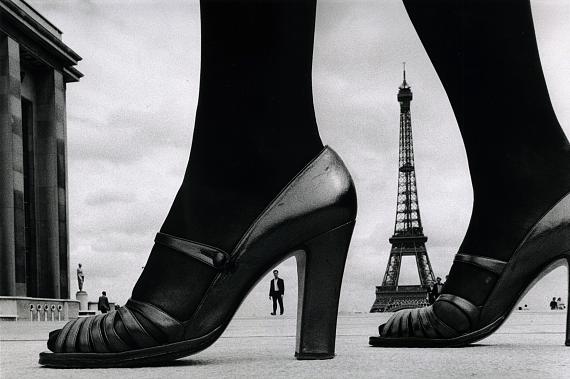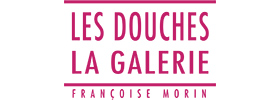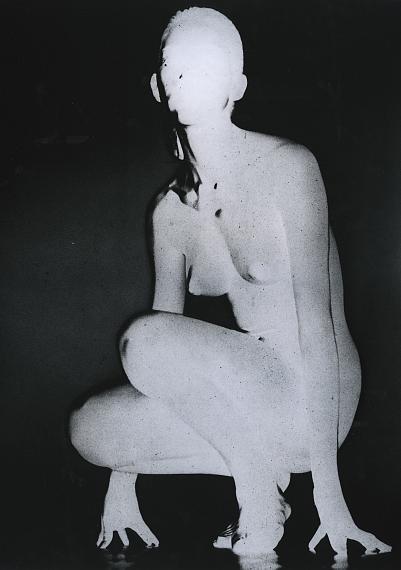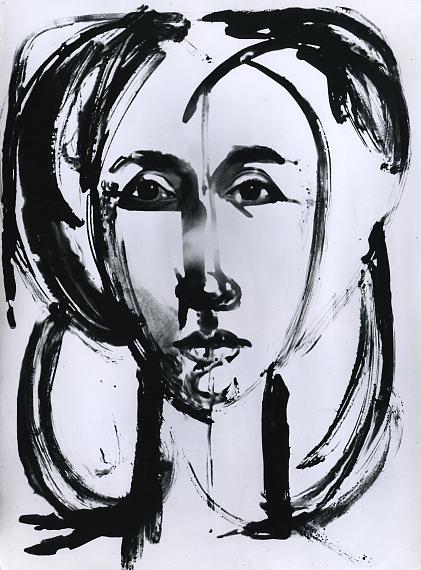
Shoes and Eiffel Tower, for Stern, Paris, France, 1974
Gelatin silver print, printed later in 2004 by Hervé Hudry / Laboratory Publimod
Image size: 9 x 14 inches | Print size: 12 x 16 inches
© Frank Horvat Studio
Paris Photo 2023
Booth F08
Berenice Abbott » Roger Ballen » André Boucher » Roger Catherineau » Robert Frank » Jean-Claude Gautrand » Anneliese Hager » Frank Horvat » Rainer Leitzgen » Leon Levinstein » Ray K. Metzker » André Steiner » Romain Urhausen »
Fair Presentation: 9 Nov – 12 Nov 2023
Wed 8 Nov
Grand Palais Ephémère
Champ-de-Mars, Place Joffre
75007 Paris

Les Douches La Galerie
54 Rue Chapon
75003 Paris
+33 1-78 94 03 00
contact@lesdoucheslagalerie.com
www.lesdoucheslagalerie.com
Wed-Sat 14-20+

Squatting Nude, 1957
Vintage gelatin silver print, printed by the artist
Image size: 16 1/2 x 12 1/4 inches | Print size: 16 1/2 x 12 1/4 inches
© Estate Romain Urhausen
Born in Italy in 1928 into a Jewish family of doctors of central European origin, Frank Horvat (FR-IT, 1928-2020) lived by
turns in Switzerland, Italy, Pakistan, India, England and France, where he settled in the late 1950s,
while regularly visiting the United States and travelling often in Europe, North and South America and
Asia. He took his first photographs in Italy with a humanist angle and was definitively marked by Henri
Cartier-Bresson whom he met in Paris and who convinced him to use a Leica and to head for India.
In the 1950s and 60s – and even afterwards as well – being a 'fashion' photographer necessarily
meant working in a studio, respecting the numerous codes that helped to 'show off' clothing, by
repeating poses and framing certain details, among other things. Frank Horvat, who loved capturing
the animated streets of Paris, shaping them, summarizing them in an instant, was the first
photographer to bring models out onto the street, to fit them back into the flow of life. While
revolutionizing approaches to fashion, Horvat nevertheless remained faithful to his endlessly
benevolent curiosity for the essentially human and to a way of practicing photography with presence
and elegance in free and ultimately joyful snapshots.
Vast, but also little known in France, the photographic works of the artistic pioneer from Luxembourg,
Romain Urhausen (LU, 1930-2021) are marked by his singular style, a mixture of the French humanist
school and the German subjective school of the 1950s and 60s, to which he actively contributed. Often
a pretext for formal and poetic exploration, his photographic subjects, tinged with humor, go beyond
a classical representation of reality. He brings an experimental, artistic approach to bear on daily life,
a man at work, an urban landscape, a nude or a self-portrait. The subjective aesthetic he learned from
Otto Steinert marked his formal language, his way of treating contrasts and composition, but also his
way of looking differently at the world. In 2022, the Rencontres d’Arles dedicated a retrospective to
him called, In His Time; the catalogue was published by Delpire & Co.
Born in 1925 in Tours, Roger Catherineau (FR, 1925-1962) studied drawing and painting at the École du Louvre and the
École des Arts de Paris before initiating his photographic practice. Disappointed by laboratories, he
would proceed and print his photographs himself. He soon developed an abstract expressionist style.
Since 1948, Roger Catherineau's photographic work has been built as a quest for experimentation.
Rejecting any notion of depiction of reality, he elaborates unreferenced, troubled, and most often
abstract images. Developing the notion of "productive transformation", he wishes to compose from
scratch the image he has of an object, and not to reproduce it. In 1955 he was invited to participate in
the major exhibition Subjektive Fotografie 2 in Saarbrücken. His work was also exhibited in France,
Belgium and Germany and published in numerous international magazines and compilations. His
photographs are in the collections of the French Musée National d'Art Moderne, the Bibliothèque
Nationale de France and the Folkwang Museum in Essen (Otto Steinert collection).

Etude d'après un visage n°15, 1960-1961
Vintage gelatin silver print, printed by the artist Print size: 12 x 8 7/8 inches
© Estate Roger Catherineau